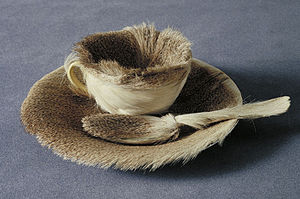- Le Déjeuner en fourrure
-
Object (Le Déjeuner en fourrure) 
Artist Méret Oppenheim Year 1936 Type Assemblage sculpture Location Museum of Modern Art, New York City Owner Museum of Modern Art Le Déjeuner en fourrure, known in English as Fur Breakfast or Breakfast in Fur, is a 1936 sculpture by the surrealist Méret Oppenheim, consisting of a fur-covered teacup, saucer and spoon.
The work, which originated in a conversation in a Paris cafe, is the most frequently-cited example of sculpture in the surrealist movement. [1][2][3] It is also noteworthy as a work with challenging themes of femininity.
Contents
History
The work's concept originated in a conversation among Oppenheim, Pablo Picasso, and his lover and fellow artist Dora Maar at a Parisian café[4] where the café's social role was discussed,[5] and at which Oppenheim was wearing a fur-covered brass tube bracelet, the pattern of which she sold to the fashion designer Elsa Schiaparelli.[1][6] Picasso had suggested that anything could be covered in fur, and Oppenheim remarked that this would apply to "even this cup and saucer".[4] Oppenheim was nearly 23 years old at the time.
Oppenheim created and exhibited the work as part of André Breton's first exhibition of surrealist sculpture (Exposition surréaliste d'objets), held at the Galerie Charles Ratton. She originally titled it prosaically as "Cup, saucer and spoon covered with fur", but the work was renamed by Breton in reference to Manet's painting Le Déjeuner sur l'herbe.[5] The work accords well with Breton's theories in his essay "The Crisis of the Object".[5]
In true found art mode, the teacup, saucer and spoon are ordinary objects purchased from Monoprix, a Paris department store.[6] The fur covering is that of a Chinese gazelle.[4]
Later in 1936, the work appeared at the London International Surrealist Exhibition, where it was noticed by Alfred H. Barr, Jr..[6] Barr then displayed the work as part of the "Fantastic Art, Dada, Surrealism" exhibition of winter 1936/1937 at the Museum of Modern Art in New York City, whose visitors selected it as "the quintessential Surrealist object."[4] Barr afterwards purchased it for the museum, where it remains in the permanent collection.[5] The enormous success of this early work would create later problems for Oppenheim as an artist,[4] and soon after its creation she drifted away from the Surrealists.[5] Decades later, in 1972, she artistically commented on its dominance of her career by producing a number of "souvenirs" of Le Déjeuner en fourrure.[7]
Interpretation
One of the women Surrealists, Oppenheim in this work combines the domesticity of the tea set (part of the traditionally feminine decorative arts) with the eroticism and animality of the fur covering.
As in other surrealist works, a visual pun is implied, and the incongruity and impracticability of the combined elements is also highlighted.[8]
References
- ^ a b Galenson, David W. (2007). Old Masters and Young Geniuses: The Two Life Cycles of Artistic Creativity. Princeton University Press. pp. 75–77. ISBN 0691133808. (Old Masters and Young Geniuses at Google Books)
- ^ Hamilton, George H. (1989). Painting and Sculpture in Europe: 1880-1940. Yale University Press. pp. 419–420. ISBN 0300056494. (Painting and Sculpture in Europe at Google Books)
- ^ "The Erotic Object: Surrealist Sculpture from the Collection". http://www.moma.org/visit/calendar/exhibitions/960. Retrieved 13 July 2011.
- ^ a b c d e "Meret Oppenheim. Object. 1936". Museum of Modern Art. http://www.moma.org/collection/browse_results.php?object_id=80997. Retrieved 11 July 2011.
- ^ a b c d e Klingsöhr-Leroy, Cathrin (2004). Uta Grosenick. ed. Surrealism. Taschen Basic Genre. Taschen. p. 80. ISBN 3822822159. (Surrealism at Google Books)
- ^ a b c Man Ray, American artist at Google Books
- ^ [1] and [2]
- ^ Rodríguez, Ninón. "Surrealism: The Search For Freedom". Miami Dade University. http://www.mdc.edu/wolfson/academic/ArtsLetters/art_philosophy/Humanities/Surrealism/Surrealism.htm. Retrieved 14 July 2011. "Meret Oppenheim's Cup, Saucer and Spoon in Fur, a humble object which by the caprice of desire is rendered useless by giving it a sumptuous appearance. Each of these objects jolt us in that they bring together two or more incongruent realities that are not normally associated together in waking life. This is a surrealist moment."
External links
- Meret Oppenheim. Object. 1936 Museum of Modern Art
- "Women artists and Surrealism" (2010) Exhibition review discusses work in context of Oppenheim's other creations.
Categories:- Surrealist works
- Found art
- Erotic art
- Sculptures of the Museum of Modern Art
- 1936 works
- Fur
- Teaware
Wikimedia Foundation. 2010.
